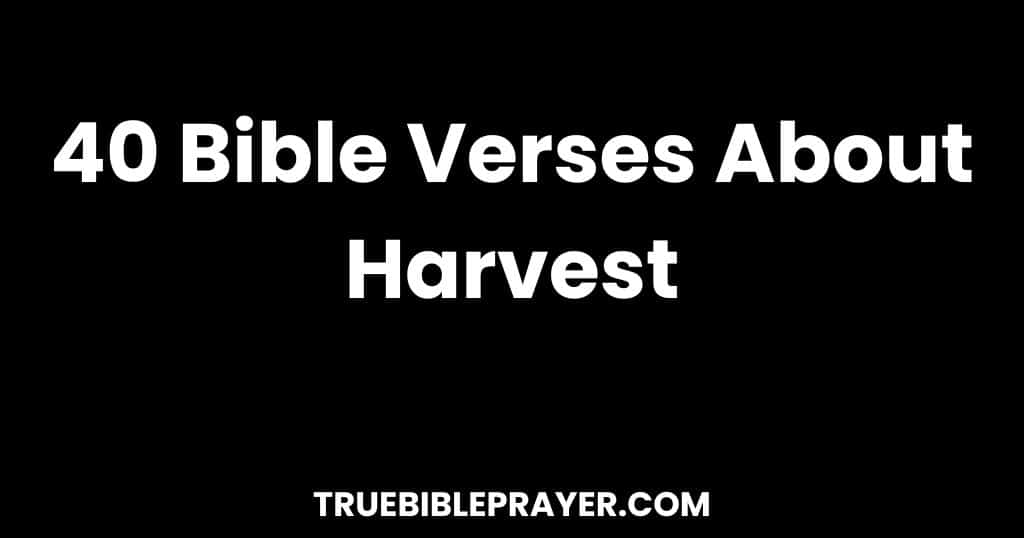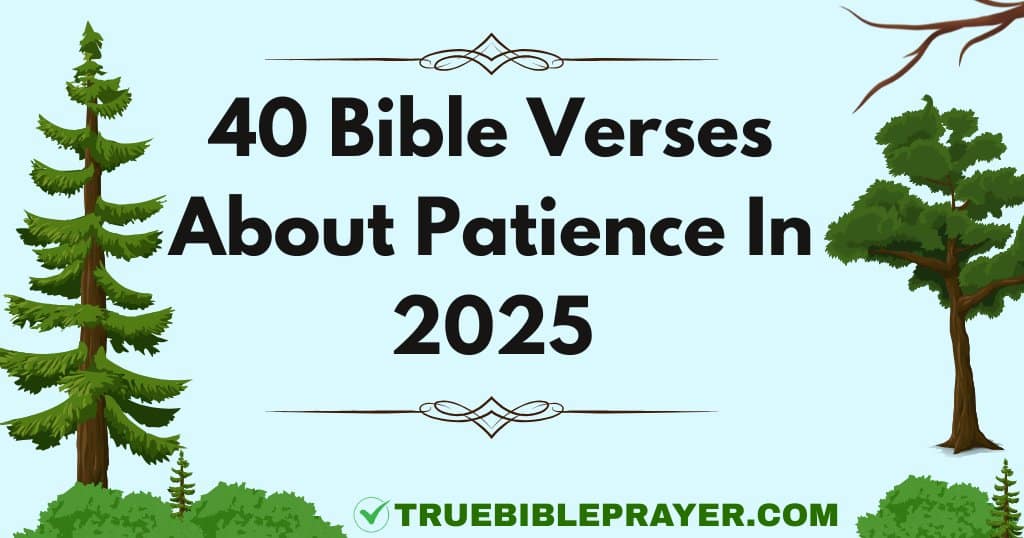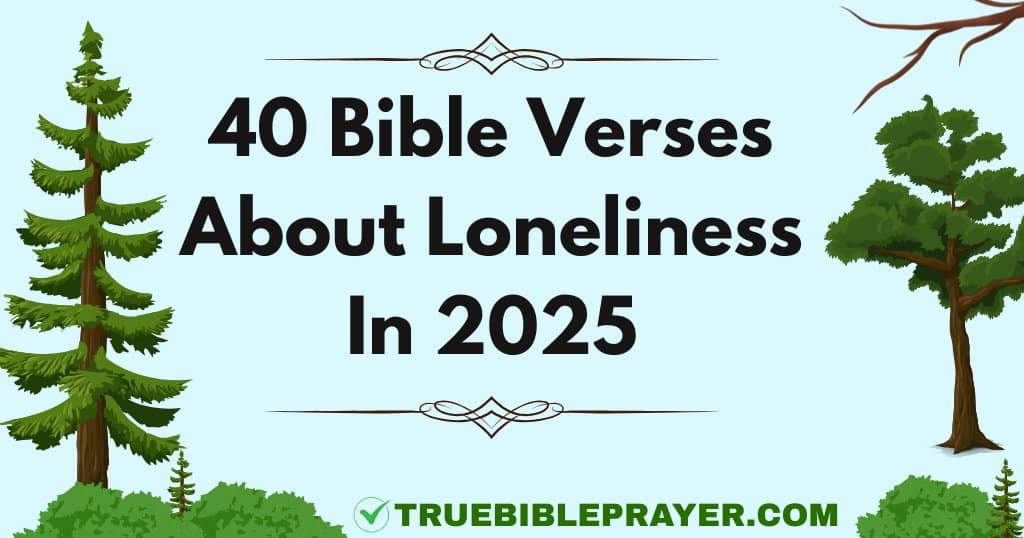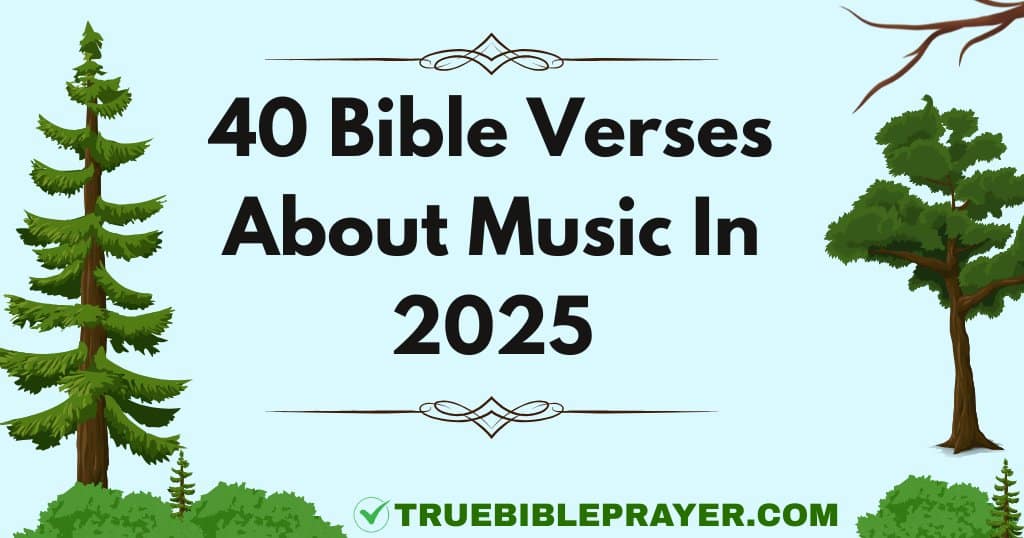Harvest is the time when planted seeds produce visible results. It means gathering what has grown after a season of work and waiting. In the Bible, harvest often points to more than crops. It reflects blessings, answered prayers, or even judgment. I believe harvest shows the link between effort and outcome. It reminds us that what we plant in faith will return in some form. Whether it is kindness, obedience, or truth, harvest reveals the result of what we chose to sow.
This article shares forty powerful Bible verses with meaningful explanations to guide your faith journey. You will gain clear insight into spiritual seasons, blessings, and the deeper purpose behind God’s timing.
what does harvest mean in the bible?
In the Bible, harvest means more than gathering crops. It often symbolizes blessing, provision, and the results of faithful living. God uses harvest to show His care for people, reminding them that obedience and trust lead to reward.
Spiritually, harvest also points to judgment, soul-winning, and eternal outcomes. It reflects how actions, choices, and words produce lasting results. The Bible uses this image to teach patience, purpose, and the importance of sowing good seeds.
God’s Provision Through the Harvest
Genesis 8:22
“As long as the earth endures, seedtime and harvest, cold and heat, summer and winter, day and night will never cease.”
Description:
God gives a timeless promise to Noah after the flood.
Interpretation:
This verse shows that harvest is part of God’s unchanging design. No matter what happens, His provision through seasons will continue. Harvest is not random — it reflects divine order and reliability.
Leviticus 26:4
“I will send you rain in its season, and the ground will yield its crops and the trees their fruit.”
Description:
A blessing given to those who obey God’s commands.
Interpretation:
Rain and harvest depend on God’s timing and grace. This verse teaches that obedience invites blessing, and harvest is one of the clear signs of God’s care.
Exodus 23:16
“Celebrate the Festival of Harvest with the firstfruits of the crops you sow in your field.”
Description:
Israel was commanded to honor God with the first portion of their harvest.
Interpretation:
This verse highlights how harvest is more than gain. It is a spiritual moment to acknowledge God’s role in every increase. Giving back from the harvest shows faith and gratitude.
Psalm 67:6
“The land yields its harvest; God, our God, blesses us.”
Description:
A declaration of divine blessing over the earth.
Interpretation:
This verse connects harvest directly to God’s hand. The result of hard work and nature is not luck — it is the outcome of God’s generous blessing.
Deuteronomy 11:14
“Then I will send rain on your land in its season, both autumn and spring rains, so that you may gather in your grain, new wine, and olive oil.”
Description:
A promise of seasonal provision for those who love and serve God.
Interpretation:
The harvest depends on divine timing. When people trust and follow God, He provides everything needed to bring their labor to completion.
Proverbs 3:9–10
“Honor the Lord with your wealth, with the firstfruits of all your crops; then your barns will be filled to overflowing, and your vats will brim over with new wine.”
Description:
A call to put God first in the blessings of increase.
Interpretation:
When people honor God during harvest, He multiplies what they have. The first part of the harvest belongs to Him, and giving it leads to greater abundance.
Joel 2:24
“The threshing floors will be filled with grain; the vats will overflow with new wine and oil.”
Description:
A prophecy of restoration after a time of loss.
Interpretation:
This verse shows that even after hardship, God can bring a rich harvest. It speaks hope to those who have endured loss — reminding them that harvest is still possible.
Psalm 85:12
“The Lord will indeed give what is good, and our land will yield its harvest.”
Description:
A declaration of God’s goodness and the resulting fruit of the land.
Interpretation:
This verse ties the goodness of God to visible results. Harvest is not just about the land — it is proof that God is active, generous, and faithful.
Jeremiah 5:24
“They do not say in their hearts, ‘Let us fear the Lord our God, who gives autumn and spring rains in season, who assures us of the weeks appointed for the harvest.’”
Description:
A rebuke to people who forgot the source of their provision.
Interpretation:
This verse warns against pride. People often enjoy the harvest but forget who makes it possible. True reverence includes recognizing God in every step of the harvest season.
Job 5:10
“He gives rain on the earth and sends waters on the fields.”
Description:
A poetic expression of God’s control over nature.
Interpretation:
This verse reminds us that harvest starts with rain, and rain comes from God. Every fruitful field is a result of heaven touching earth.
Spiritual Lessons from the Harvest
Galatians 6:9
“Let us not become weary in doing good, for at the proper time we will reap a harvest if we do not give up.”
Description:
A call to keep doing good, even when results seem delayed.
Interpretation:
Harvest requires patience. This verse teaches that spiritual rewards come in God’s time. Faithfulness always leads to fruit, even when it takes longer than expected.
James 3:18
“Peacemakers who sow in peace reap a harvest of righteousness.”
Description:
A promise to those who live with peace and wisdom.
Interpretation:
This verse links behavior to results. Those who pursue peace will eventually see righteous fruit. Every peaceful act is a seed that grows over time.
Hosea 10:12
“Sow righteousness for yourselves, reap the fruit of unfailing love, and break up your unplowed ground; for it is time to seek the Lord, until he comes and showers his righteousness on you.”
Description:
An invitation to return to God through right actions.
Interpretation:
Harvest in this verse means spiritual renewal. The heart is soil. When prepared and sown with righteousness, it brings lasting love and divine favor.
2 Corinthians 9:10
“Now he who supplies seed to the sower and bread for food will also supply and increase your store of seed and will enlarge the harvest of your righteousness.”
Description:
God promises to provide and multiply what we give.
Interpretation:
God not only gives the seed but also increases the results. When we give generously and live rightly, He expands both our reach and our impact.
Proverbs 22:8
“Whoever sows injustice reaps calamity, and the rod they wield in fury will be broken.”
Description:
A warning about the danger of evil actions.
Interpretation:
This verse teaches that harvest can be both positive and negative. What we plant in attitude and action will return to us in kind.
Matthew 13:23
“But the seed falling on good soil refers to someone who hears the word and understands it. This is the one who produces a crop, yielding a hundred, sixty or thirty times what was sown.”
Description:
Part of Jesus’ parable about the sower and the seeds.
Interpretation:
True spiritual harvest comes from understanding and obeying the Word. The better the heart’s condition, the greater the fruit.
Proverbs 11:18
“A wicked person earns deceptive wages, but the one who sows righteousness reaps a sure reward.”
Description:
A contrast between evil gain and faithful living.
Interpretation:
This verse confirms that righteous living always produces something lasting. Unlike temporary gain from evil, the harvest of righteousness is secure.
Isaiah 32:20
“Blessed are you who sow beside all waters, who let the feet of the ox and the donkey range free.”
Description:
A blessing on those who sow freely and live in peace.
Interpretation:
Spiritual generosity brings blessing. Those who sow in many places will see unexpected harvests, even in overlooked areas of life.
Psalm 126:5
“Those who sow with tears will reap with songs of joy.”
Description:
A promise to those who endure pain with faith.
Interpretation:
Even suffering has a harvest. God sees every tear, and over time, pain can produce joy and restoration far beyond expectation.
Ecclesiastes 11:6
“Sow your seed in the morning, and at evening let your hands not be idle, for you do not know which will succeed, whether this or that, or whether both will do equally well.”
Description:
Wisdom for working diligently and trusting the outcome.
Interpretation:
This verse encourages steady faith. Plant in many ways and trust God to bless what grows. Not every seed shows results immediately, but persistence matters.
Harvest as Evangelism and Mission
Matthew 9:37–38
“Then he said to his disciples, ‘The harvest is plentiful but the workers are few. Ask the Lord of the harvest, therefore, to send out workers into his harvest field.’”
Description:
Jesus speaks to His disciples about the need for spiritual workers.
Interpretation:
The world is full of people ready to receive truth. This verse shows that harvest represents souls. God is calling believers to step out and serve.
Luke 10:2
“He told them, ‘The harvest is plentiful, but the workers are few. Ask the Lord of the harvest, therefore, to send out workers into his harvest field.’”
Description:
Jesus repeats the same message while sending out the seventy-two.
Interpretation:
The need is great, but few respond. This verse urges prayer and action. Believers are the laborers meant to bring in the spiritual harvest.
John 4:35
“Do you not say, ‘Four more months and then the harvest’? I tell you, open your eyes and look at the fields! They are ripe for harvest.”
Description:
Jesus encourages His followers to see spiritual opportunity now.
Interpretation:
There is no need to wait. People are ready now to hear and receive. This verse challenges delay and calls for immediate mission work.
Matthew 13:30
“Let both grow together until the harvest. At that time I will tell the harvesters: First collect the weeds and tie them in bundles to be burned; then gather the wheat and bring it into my barn.”
Description:
Jesus explains what will happen at the end of the age.
Interpretation:
This harvest represents final judgment. God allows good and evil to grow together for a time, but separation will come.
Mark 4:29
“As soon as the grain is ripe, he puts the sickle to it, because the harvest has come.”
Description:
Jesus uses a simple image to explain the readiness of a season.
Interpretation:
This verse shows that God knows the right moment for action. When a soul is ready, the harvest happens. We must remain alert and prepared.
John 4:36
“Even now the one who reaps draws a wage and harvests a crop for eternal life, so that the sower and the reaper may be glad together.”
Description:
Jesus teaches that spiritual harvest brings eternal joy.
Interpretation:
This verse highlights teamwork in ministry. Some plant seeds, others gather, but both share the reward. The joy is in seeing lives changed forever.
Matthew 13:39
“And the enemy who sows them is the devil. The harvest is the end of the age, and the harvesters are angels.”
Description:
Part of the explanation of the parable of the weeds.
Interpretation:
Harvest here represents the final gathering of people. It is a time of sorting and truth. Angels will separate those who followed God from those who did not.
Revelation 14:15
“Another angel came out of the temple and called in a loud voice to him who was sitting on the cloud, ‘Take your sickle and reap, because the time to reap has come, for the harvest of the earth is ripe.’”
Description:
A prophetic vision of the final harvest of humanity.
Interpretation:
This verse shows the seriousness of God’s timing. When the earth is ripe, He will act. It is a reminder that spiritual harvest has eternal weight.
Romans 1:13
“I planned many times to come to you (but have been prevented from doing so until now) in order that I might have a harvest among you, just as I have had among the other Gentiles.”
Description:
Paul expresses his desire to see spiritual fruit in Rome.
Interpretation:
This verse uses harvest as a picture of ministry success. Paul longs to see lives transformed through his message. Real harvest means real change.
Colossians 1:6
“The gospel is bearing fruit and growing throughout the whole world — just as it has been doing among you since the day you heard it and truly understood God’s grace.”
Description:
Paul reminds the Colossians of the power of the gospel.
Interpretation:
Harvest is happening everywhere the gospel is received. This verse shows that truth spreads and grows, even when we do not see it all.
Warnings, Judgment, and Responsibility in the Harvest
Proverbs 10:5
“He who gathers crops in summer is a prudent son, but he who sleeps during harvest is a disgraceful son.”
Description:
This proverb contrasts wisdom and laziness during harvest time.
Interpretation:
Harvest is a time to act. Delay leads to loss. The verse warns that those who ignore opportunity bring shame, while the wise gather what has been prepared.
Joel 3:13
“Swing the sickle, for the harvest is ripe. Come, trample the grapes, for the winepress is full and the vats overflow — so great is their wickedness!”
Description:
A vision of judgment on nations who oppose God.
Interpretation:
Here, harvest is used to describe the moment when sin must be judged. It reminds us that delay does not remove accountability — the time of reckoning always comes.
Micah 6:15
“You will plant but not harvest; you will press olives but not use the oil, you will crush grapes but not drink the wine.”
Description:
A warning of withheld blessings due to disobedience.
Interpretation:
This verse shows that sin blocks results. Even when effort is made, harvest can be withheld if hearts are far from God. Obedience opens the way to fruitfulness.
Jeremiah 8:20
“The harvest is past, the summer has ended, and we are not saved.”
Description:
A cry of despair from people who missed their time of deliverance.
Interpretation:
This verse is a painful warning. Spiritual seasons do not last forever. When harvest ends, the chance to respond may be gone. It calls for urgency and reflection.
Isaiah 17:11
“Though you set out the finest plants and plant imported vines, though on the day you set them out, you make them grow, yet the harvest will be as nothing in the day of disease and incurable pain.”
Description:
A judgment against a nation that trusted its own strength.
Interpretation:
Effort without dependence on God leads to empty results. The verse teaches that true harvest comes from alignment with God, not just strategy or skill.
Job 4:8
“As I have observed, those who plow evil and those who sow trouble reap it.”
Description:
A reflection on the nature of consequences.
Interpretation:
Harvest applies to all actions, good or bad. When people sow harm, they cannot escape the return. This verse stresses moral responsibility in every seed planted.
Isaiah 9:3
“You have enlarged the nation and increased their joy; they rejoice before you as people rejoice at the harvest, as warriors rejoice when dividing the plunder.”
Description:
A celebration of God’s deliverance and blessing.
Interpretation:
Harvest brings joy and relief. This verse shows how God’s intervention turns sorrow into praise. It uses harvest as a picture of victory and abundance.
Lamentations 1:15
“The Lord has rejected all the warriors in my midst; he has summoned an army against me to crush my young men. In his winepress the Lord has trampled Virgin Daughter Judah.”
Description:
A poetic image of God’s judgment on Jerusalem.
Interpretation:
Harvest as judgment appears again here. God is shown pressing His people like grapes in a winepress. It is a sobering reminder of how sin invites divine correction.
Amos 4:7
“I also withheld rain from you when the harvest was still three months away. I sent rain on one town, but withheld it from another.”
Description:
A warning to people who refused to return to God.
Interpretation:
God controls the conditions of harvest. This verse reminds us that when hearts resist Him, even the weather may testify against us. Spiritual disobedience has real-world effects.
Isaiah 17:5
“It will be as when reapers harvest the standing grain, gathering the grain in their arms — as when someone gleans heads of grain in the Valley of Rephaim.”
Description:
A prophecy about the fall of Damascus and its people.
Interpretation:
This image shows a harvest of judgment. The act of reaping becomes a symbol of removal and loss. It reminds us that harvest can be either joy or sorrow, depending on what was sown.
Conclusion
The Bible makes it clear that harvest is more than just a season. It is a picture of God’s faithfulness, a call to action, and a reminder that what we plant always returns in time. Through these forty verses, you have seen how harvest reflects blessing, purpose, warning, and hope.
This article brought together God’s truth to help you understand harvest from a deeper, more personal place. Whether you came looking for answers, encouragement, or direction, you now hold words that speak to every heart season.




